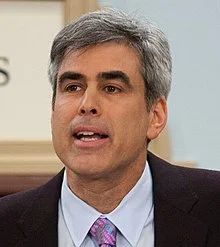Topics Discussed in Lex Fridman Podcast #192 – Lex Fridman & Jonathan Haidt: Social media and mental health, Mark Zuckerberg, Children’s use of social media, Social media and democracy, Elon Musk and Twitter, Anonymity on social media, Misinformation, Social media benefits, Political division on social media, Future of social media, Advice for young people.
Lex Fridman Podcast: Conversations about science, technology, history, philosophy and the nature of intelligence, consciousness, love, and power. Lex is an AI researcher at MIT and beyond.

Jonathan Haidt
Jonathan David Haidt is an American social psychologist, Professor of Ethical Leadership at New York University Stern School of Business, and author. His main areas of study are the psychology of morality and moral emotions. Haidt's main scientific contributions come from the psychological field of moral foundations theory, which attempts to explain the evolutionary origins of human moral reasoning on the basis of innate, gut feelings rather than logic and reason. The theory was later extended to explain the different moral reasoning and how they relate to political ideology, with different political orientations prioritizing different sets of morals. The research served as a foundation for future books on various topics.
Books Mentioned in this Podcast with Lex Fridman & Jonathan Haidt:
The Complex Impact of Social Media: Navigating the Positives and Negatives
In our ever-connected world, social media platforms have become an integral part of our daily lives. From staying in touch with friends and family to sharing our thoughts, ideas, and experiences, these digital landscapes offer a myriad of opportunities. However, just like any powerful tool, social media comes with its share of complexities. In this article, we will delve into the multifaceted world of social media, exploring both the positive and negative aspects that define our online experiences.
The Positives: Connecting and Community Building
One of the most touted advantages of social media is its ability to connect people from diverse backgrounds and locations. For many individuals, social media platforms provide a sense of belonging and community. For example, LGBTQ+ youth, who may feel isolated in their offline environments, often find solace in online communities that offer support and understanding. This sense of connection can be a lifeline for those who might otherwise struggle to find their place in the world.
Moreover, social media allows individuals to exchange ideas and information on a global scale. It serves as a virtual town square where conversations on everything from politics to hobbies flourish. In this regard, it fosters diversity of thought, offering a platform for constructive dialogue and debate. The ability to learn from different perspectives can be enriching and enlightening.
The Negatives: Mental Health and Cyberbullying
While there are undoubtedly positive aspects to social media, the negatives should not be underestimated. A growing body of research suggests that excessive use of these platforms can have detrimental effects on mental health, particularly among teenagers. It’s crucial to recognize that the average experience on social media is a mix of positive and negative emotions.
Studies indicate that cyberbullying, a pervasive issue on social media, can lead to feelings of fear, anxiety, and depression among young users. While some may argue that it provides a space for communities to form, these same platforms can also be breeding grounds for hatred and harassment. The dichotomy between positive and negative experiences underscores the complexity of social media’s impact.
Navigating the Social Media Landscape
So, how can we navigate this complex landscape effectively? It’s essential to acknowledge that the impact of social media varies from person to person and platform to platform. While some individuals might find it to be a source of joy and connection, others may struggle with its darker aspects.
One potential solution lies in addressing the dynamics and architecture of social media. Rather than focusing solely on content moderation and censorship, we should consider the larger picture. The architecture of social media, including algorithms that determine what content is shown and to whom, plays a significant role in shaping our online experiences.
Incentivizing Positive Engagement
Shifting the focus toward incentivizing positive engagement is one way to improve the social media landscape. Imagine if platforms were designed to discourage aggressive and hostile behavior while promoting constructive discourse. This could be achieved by rating users based on their behavior and allowing others to filter out those who engage in toxic interactions. Such an approach would not stifle free speech but rather encourage users to contribute positively to the online community.
The Role of Regulation
Another critical aspect to consider is regulation. The debate over regulating social media often centers around concerns of censorship. However, it’s important to frame regulation as a means to address the architecture and dynamics that contribute to negative outcomes. Regulation should aim to mitigate the harm caused by misinformation, cyberbullying, and other detrimental online behaviors.
Conclusion
In conclusion, the impact of social media on society is a complex and multifaceted issue. While it offers opportunities for connection and diverse dialogue, it also presents challenges related to mental health and the spread of harmful content. To create a healthier online environment, we must shift our focus from content moderation alone to addressing the dynamics and architecture that shape our interactions. By incentivizing positive engagement and considering thoughtful regulation, we can work toward a more balanced and constructive online world.





